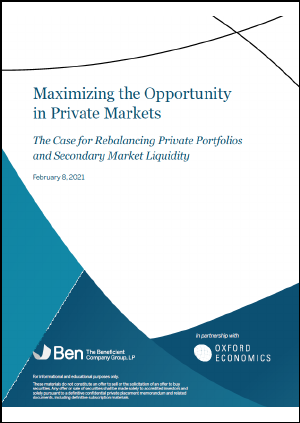Ungated Post | 09 Feb 2021
Maximizing the Opportunity in Private Markets

In a new white paper The Beneficient Company Group Ltd and Oxford Economics explore how investors can maximize the opportunity in private markets amid a subdued economy and the risks they must navigate in doing so.
Portfolio construction and rebalancing around market cycles is a widely accepted and important approach in public asset management; for similar reasons this approach can benefit alternative asset investors. Many investors in private markets have traditionally relied on fund manager skill, so-called manager selection, rather than looking more holistically at their allocations and diversifying broadly across the private asset class. Yet we know that different private fund strategies tend to outperform in certain economic and market environments; venture capital, for instance, outperformed in the late 1990s but then struggled in the dot-com correction afterwards.
Meanwhile, investing during the next five years is likely to be characterized by low nominal returns and uneven asset performance, while the hardest-hit sectors during the pandemic could benefit from a rebound in valuations. In this paper, we utilize Ben’s portfolio allocation framework customized to private assets to analyze and forecast the risk/reward profile of private fund strategies. In accordance with Oxford Economics’ baseline macroeconomic forecasts, our analysis suggests that private real estate and natural resource funds currently are relatively attractive portfolio overweights. However, stretched equity valuations suggest caution when allocating towards venture capital strategies in the near-term, when the industry is at record levels of investment capital and competition for deals that are priced at significant historical premiums.
Macro and Investor Services
Our economic consulting and thought leadership teams are world leaders in quantitative economic analysis and original, evidence-based research, working with clients around the globe and across sectors to build models, forecast markets, run extensive surveys, and evaluate interventions using state-of-the-art techniques. Lead consultants on this project were:
Oxford Economics’ team is expert at applying advanced economic tools that provide valuable insights into today’s most pressing business, financial, and policy issues.
To find out more about our capabilities, contact:
EMEA
Graeme Harrison
+44 (0) 289 263 5417
Email
Americas
Michael Kleiman
+1 646 503 3064
Email
Asia
Rhianne Clark
+65 6850 0112
Email
Related Services

Post
The economic impact of abandoning the WTO
Oxford Economics have been commissioned by the International Chamber of Commerce (ICC) to provide an independent assessment of the economic impact of WTO dissolution. This report details our findings and the assumptions underpinning our analysis.
Find Out More
Post
The economic impact of the sports activities of public service media
This study shows how the sports activities of public service media supported €4.5 billion of GDP and 57,000 jobs across 31 European countries in 2022, taking direct, indirect (supply chain), and induced (wage-funded expenditure) impacts into account. The report also highlights wider economic benefits of public service media sports coverage, such as the way in which it leverages sponsorship income for sports bodies.
Find Out More
Post
Global Trade Education: The role of private philanthropy
Global trade can amplify economic development and poverty alleviation. Capable leaders are required to put in place enabling conditions for trade, but currently these skills are underprovided in developing countries. For philanthropists, investing in trade leadership talent through graduate-level scholarships is an opportunity to make meaningful contributions that can multiply and sustain global economic development.
Find Out More